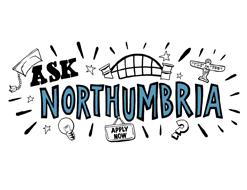-
Study
-
Quick Links
- Course Search
- Fees and Funding
- Unlock Your Potential
- Still time to Apply
- Higher and Degree Apprenticeships
- Continuing Professional Development
- Still time to apply
-
Undergraduate
- Application Guides
- UCAS Exhibitions
- Foundation Years
- School & College Outreach
- Information for Parents
-
Postgraduate
- Application Guide
- Postgraduate Research Degrees
- Flexible Learning
- Change Direction
- Register your Interest
-
-
International
International
Northumbria’s global footprint touches every continent across the world, through our global partnerships across 17 institutions in 10 countries, to our 277,000 strong alumni community and 150 recruitment partners – we prepare our students for the challenges of tomorrow. Discover more about how to join Northumbria’s global family or our partnerships.
View our Global Footprint-
Quick Links
- Course Search
- Undergraduate Study
- Postgraduate Study
- Information for Parents
- London Campus
- Northumbria Pathway
- Cost of Living
- Sign up for Information
-
International Students
- Information for Students
- International Events
- Application Guide
- Entry Requirements and Education Country Agents
- Global Offices
- English Requirements
- English Language Centre
- International student support
- Cost of Living
-
International Fees and Funding
- International Undergraduate Fees
- International Undergraduate Funding
- International Masters Fees
- International Masters Funding
- International Postgraduate Research Fees
- International Postgraduate Research Funding
-
International Partners
- Agent and Representative Network
- Global Partnerships
- Global Community
-
International Mobility
- Information for Northumbria Students
- Information for Incoming Exchange Students
-
-
Business
Business
The world is changing faster than ever before. The future is there to be won by organisations who find ways to turn today's possibilities into tomorrows competitive edge. In a connected world, collaboration can be the key to success.
More on our Business Services -
Research
Research
Northumbria is a research-rich, business-focused, professional university with a global reputation for academic quality. We conduct ground-breaking research that is responsive to the science & technology, health & well being, economic and social and arts & cultural needs for the communities
Discover more about our Research -
About Us
-
About Northumbria
- Our Strategy
- Our Staff
- Place and Partnerships
- Leadership & Governance
- Academic Departments
- University Services
- History of Northumbria
- Contact us
- Online Shop
-
-
Alumni
Alumni
Northumbria University is renowned for the calibre of its business-ready graduates. Our alumni network has over 246,000 graduates based in 178 countries worldwide in a range of sectors, our alumni are making a real impact on the world.
Our Alumni - Work For Us
What will I learn on this module?
The module will focus not only on the craft of writing for performance, but also on how a script plays out in real space and time, and in front of an audience. It will be grounded in the possibilities and practical limitations of writing for theatre. This module is designed to engender a critical understanding of the principal theories and concepts of dramaturgy and performance, and will also focus on the practical mechanics of how plays work and how they are structured. Students will examine a number of work-in-progress texts, and will employ research and literary analysis very specifically to illuminate the issues raised in the practical realization of plays.
How will I learn on this module?
You will learn through two weekly 90-minute seminars, individual tutorials, and independent learning. Working in a small tutorial groups, Students will be focusing on a number of plays of varying form and size. Along with conducting appropriate contextual research, they will be carrying out a literary analysis of form, style, structure, language and thematic ideas. Each play will be examined in terms of the very specific challenges it poses in practical production. You will discuss and analyse these texts in order to develop your understanding, and carry out writing activities in order to produce your own work.
At Level 6 the main impetus of your work must come from you: independent writing and study will form the main learning activity, and you must conceive, plan and drive forward your own writing project for this module. It is your opportunity to design and carry out your own piece of creative writing, putting into practice the techniques you have acquired on the degree so far. Your independent learning will be focused on reading and on producing your own writing for the stage. Tutorials will enable you to gain one-to-one tutor feedback and to talk to your tutor about the development of your work.
How will I be supported academically on this module?
Support will come from tutors through seminars and individual tutorials. We will help you engage with a range of literary, theoretical, critical and reflective texts and provide writing exercises to help you produce your own writing for the stage. We will provide tutor feedback and enable you to receive peer feedback on your draft work, to help you make your writing as good as it can be.
Tutors will make module information, learning materials and details of assessment available on the University’s eLearning Portal. We will help you to understand what is required in assessments and how your work will be measured against the assessment criteria.
The module tutor will be available in seminars, as well as during office hours, to discuss any queries or concerns you have.
You will also have access to a Guidance Tutor to support you on academic matters and provides to links for support on other matters. You will be invited to meet your Guidance Tutor regularly to review your progress. The Guidance Booklet, which you receive at the start of your first year, includes structured materials designed to help you develop your self-reflection skills. These materials underpin the academic side of the regular Guidance meetings, helping you to learn how to best use the feedback you receive on your assignments, how to build on your strengths, and improve in the areas where you could perform better.
What will I be expected to read on this module?
All modules at Northumbria include a range of reading materials that students are expected to engage with. Online reading lists (provided after enrolment) give you access to your reading material for your modules. The Library works in partnership with your module tutors to ensure you have access to the material that you need.
What will I be expected to achieve?
Knowledge & Understanding:
• A critical understanding of a range of theories and concepts in the analysis of dramatic playwriting and the context in which plays are produced and received
Intellectual / Professional skills & abilities:
• Ability to demonstrate originality in articulating a point of view with confidence, clarity and vision
• Ability to Identify and solve creative problems in play structure, content or story
• Ability to demonstrate a detailed and critical understanding of the relationship between the various parts of dramatic story-telling, including character, dialogue, plot, theme and visual/aural elements
• Ability to Evaluate current research and scholarship in dramatic literary theory.
Personal Values Attributes (Global / Cultural awareness, Ethics, Curiosity) (PVA):
• How will I be assessed? (SRS 0006)
Please give details of all formative and summative assessment process indicating which MLOs will be addressed and how feedback will be provided.
Through the module there will be two projects to complete – one will be formative and purely analytical. A series of script reports) assessing the relationships between language, character and narrative; and in which a number of challenges are identified, along with a series of proposed practical solutions in production. Their weekly presentation and resultant peer exchange will form a significant part of the learning and will ideally simulate the dynamics of a lively literary department script meeting
The second project will be summative. This will involve the writing of a short script accompanied by a reflective commentary - that asks students to reflect on the decisions they have made in their writing and how their choices have been impacted by the plays they have critically read during the module.
Formative
Peer and tutor feedback will be provided on script reports in seminar sessions.
Summative
A portfolio made up of:
• 15pp script
• with a 500-word critical commentary positioning the work in relation to other texts
A single mark is given, based on the literary merit of the creative component, and on the extent to which it applies ideas learned in the module, as evidenced by the commentary. Programme (Level) Learning Outcomes that this module contributes to:
[Please insert PLO number as listed on the programme specification]
Knowledge & Understanding:
•
Intellectual / Professional skills & abilities:
•
Personal Values Attributes (Global / Cultural awareness, Ethics, Curiosity) (PVA):
•
How will I be assessed?
Through the module there will be two projects to complete – one will be formative and purely analytical. A series of script reports) assessing the relationships between language, character and narrative; and in which a number of challenges are identified, along with a series of proposed practical solutions in production. Their weekly presentation and resultant peer exchange will form a significant part of the learning and will ideally simulate the dynamics of a lively literary department script meeting
The second project will be summative. This will involve the writing of a short script accompanied by a reflective commentary - that asks students to reflect on the decisions they have made in their writing and how their choices have been impacted by the plays they have critically read during the module.
Formative
Peer and tutor feedback will be provided on script reports in seminar sessions.
Summative
A portfolio made up of:
• 15pp script
• with a 500-word critical commentary positioning the work in relation to other texts
A single mark is given, based on the literary merit of the creative component, and on the extent to which it applies ideas learned in the module, as evidenced by the commentary.
Pre-requisite(s)
N/A
Co-requisite(s)
N/A
Module abstract
Led by award-winning playwright and dramaturge May Sumbwanyambe, this module offers a high level of contact with the theatre industry. Something that will appeal to emerging playwrights, directors, dramaturges, performance artists and critics, equally. The Module focuses not only on the craft of writing for performance, but also on how a script plays out in real space and time, and in front of an audience. You will be taught through a dynamic combination of seminars, workshops, and one-to-one supervision.
Course info
UCAS Code QW38
Credits 20
Level of Study Undergraduate
Mode of Study 3 years Full Time or 4 years with a placement (sandwich)/study abroad
Department Humanities
Location City Campus, Northumbria University
City Newcastle
Start September 2025 or September 2026
All information is accurate at the time of sharing.
Full time Courses are primarily delivered via on-campus face to face learning but could include elements of online learning. Most courses run as planned and as promoted on our website and via our marketing materials, but if there are any substantial changes (as determined by the Competition and Markets Authority) to a course or there is the potential that course may be withdrawn, we will notify all affected applicants as soon as possible with advice and guidance regarding their options. It is also important to be aware that optional modules listed on course pages may be subject to change depending on uptake numbers each year.
Contact time is subject to increase or decrease in line with possible restrictions imposed by the government or the University in the interest of maintaining the health and safety and wellbeing of students, staff, and visitors if this is deemed necessary in future.
Useful Links
Find out about our distinctive approach at
www.northumbria.ac.uk/exp
Admissions Terms and Conditions
northumbria.ac.uk/terms
Fees and Funding
northumbria.ac.uk/fees
Admissions Policy
northumbria.ac.uk/adpolicy
Admissions Complaints Policy
northumbria.ac.uk/complaints













